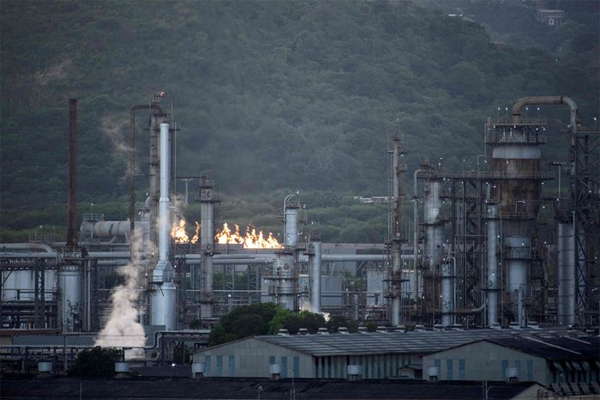
Myra P. Saefong, MarketWatch
SAN FRANCISCO
EnergiesNet.com 10 16 2023
A lifting of U.S. sanctions on Venezuelan oil would lead to more oil on the global markets but mark the start of a “long journey” for the South American country’s efforts to boost production, economists at Capital Economics said on Monday.
The Biden administration and the government of Venezuelan President Nicolás Maduro have agreed to a deal under which the U.S. would ease sanctions on Venezuela’s oil industry, according to a report Monday by the Washington Post, which cited two people familiar with the talks. Venezuela, in return, would conduct a competitive, internationally monitored presidential election next year, the report said.
According to the report, the deal would hinge on the Maduro government and the opposition reaching an agreement at meetings that start Tuesday in Barbados, William Jackson and Caroline Bain, economists at Capital Economics, wrote in a note titled “Venezuela: raising oil output will be a long journey.”
If a deal is secured, there will be a lot of attention on whether the Maduro government honors its side of the deal, the economists said, noting that past elections were “marred by irregularities and were widely disputed by the international community” and by Venezuela’s opposition.
The deal would reportedly include a time limit on sanctions relief that would allow the U.S. to “pull the plug if Venezuela backslides,” they said.
U.S. sanctions have certainly played a role in the decline in Venezuela’s oil production, the economists said, with the nation’s oil production falling from more than 1 million barrels a day to less than 400,000 barrels a day in 2020, after the Trump administration ramped up sanctions in 2019.
Given that, there is “probably scope for production, which has started to rise, to increase further if sanctions are lifted,” they said.
Still, sanctions only “explain part of the demise of Venezuela’s oil sector,” Jackson and Bain said, adding that oil production has been in “terminal decline” since its most recent peak at 3.5 million barrels per day in 2005.
“That reflects years of underinvestment and the loss of skilled labour … which have undermined production, and potential production,” they wrote. It will require “enormous amounts of investment and take a lot of time to restore production back to anything like that level.”
‘While lifting of U.S. sanctions would facilitate higher oil output from Venezuela in the medium term … we are skeptical that it will make much difference to the global oil market in the near term.’ – Willam Jackson and Caroline Bain, Capital Economics
This feature is powered by text-to-speech technology. Want to see it on more articles?
Give your feedback below or email audiofeedback@marketwatch.com.
A lifting of U.S. sanctions on Venezuelan oil would lead to more oil on the global markets but mark the start of a “long journey” for the South American country’s efforts to boost production, economists at Capital Economics said on Monday.
The Biden administration and the government of Venezuelan President Nicolás Maduro have agreed to a deal under which the U.S. would ease sanctions on Venezuela’s oil industry, according to a report Monday by the Washington Post, which cited two people familiar with the talks. Venezuela, in return, would conduct a competitive, internationally monitored presidential election next year, the report said.
According to the report, the deal would hinge on the Maduro government and the opposition reaching an agreement at meetings that start Tuesday in Barbados, William Jackson and Caroline Bain, economists at Capital Economics, wrote in a note titled “Venezuela: raising oil output will be a long journey.”
If a deal is secured, there will be a lot of attention on whether the Maduro government honors its side of the deal, the economists said, noting that past elections were “marred by irregularities and were widely disputed by the international community” and by Venezuela’s opposition.
The deal would reportedly include a time limit on sanctions relief that would allow the U.S. to “pull the plug if Venezuela backslides,” they said.
U.S. sanctions have certainly played a role in the decline in Venezuela’s oil production, the economists said, with the nation’s oil production falling from more than 1 million barrels a day to less than 400,000 barrels a day in 2020, after the Trump administration ramped up sanctions in 2019.
Given that, there is “probably scope for production, which has started to rise, to increase further if sanctions are lifted,” they said.
Still, sanctions only “explain part of the demise of Venezuela’s oil sector,” Jackson and Bain said, adding that oil production has been in “terminal decline” since its most recent peak at 3.5 million barrels per day in 2005.
“That reflects years of underinvestment and the loss of skilled labour … which have undermined production, and potential production,” they wrote. It will require “enormous amounts of investment and take a lot of time to restore production back to anything like that level.”
‘While lifting of U.S. sanctions would facilitate higher oil output from Venezuela in the medium term … we are skeptical that it will make much difference to the global oil market in the near term.’ — William Jackson and Caroline Bain, Capital Economics
Even though U.S. oil company Chevron Corp. CVX, +0.82% was given permission to restart operations in the country in late 2022, Venezuela’s oil production was only up by 70,000 barrels per day in September, year on year, the economists said.
All told, “while lifting of U.S. sanctions would facilitate higher oil output from Venezuela in the medium term, (if U.S. conditions are met), we are skeptical that it will make much difference to the global oil market in the near term,” Jackson and Bain said.

So even assuming some increase in Venezuela’s oil output, Capital Economics continues to expect the oil market to be “finely balanced in 2024,” after a “deep deficit” in global oil market supplies this year, the economists said.
marketwatch.com 10 16 2023












